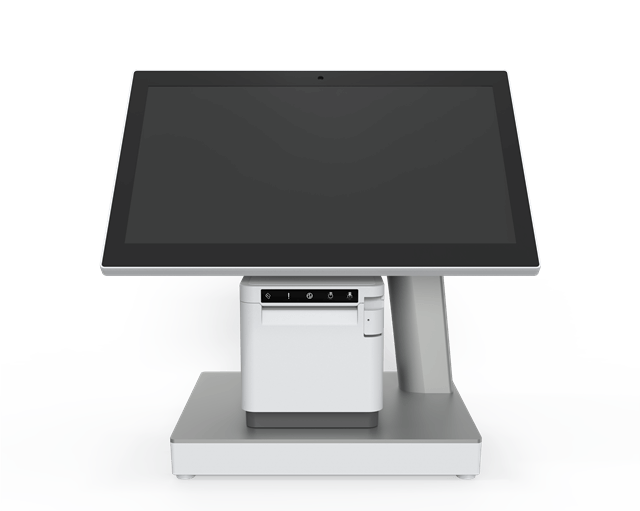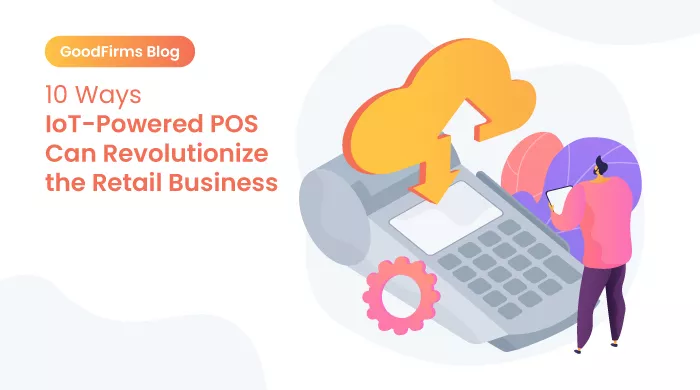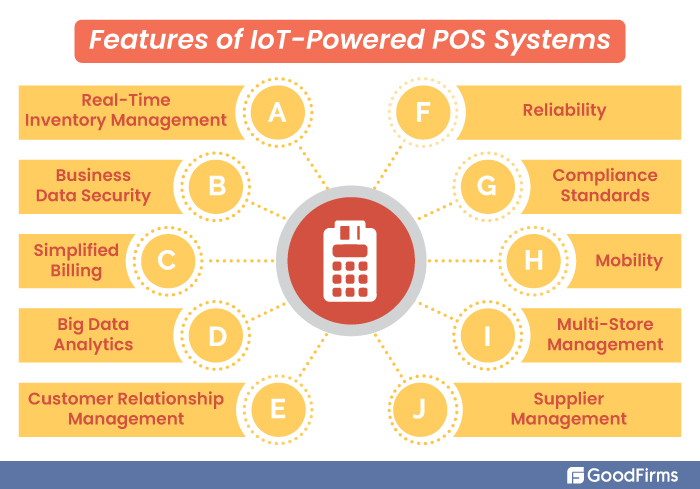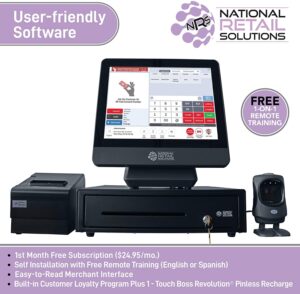
Imagine a world where managing your retail business is easier, more efficient, and more profitable than ever before. With the power of retail point of sale systems, this dream becomes a reality. These innovative systems have the ability to revolutionize your business by streamlining operations, improving customer experiences, and ultimately boosting profits. Say goodbye to manual processes and hello to a world of increased productivity and success. In this article, we will explore the exciting potential of retail point of sale systems and discover how they can transform your business.

1. Understanding Retail Point of Sale Systems
1.1 What are retail point of sale systems?
Retail point of sale (POS) systems are software and hardware solutions that facilitate the transactions and operations involved in retail businesses. They serve as a central hub for processing sales, managing inventory, tracking customer information, and analyzing data to improve business efficiency. Retail POS systems are typically composed of a combination of hardware components such as cash registers, barcode scanners, and receipt printers, and software applications that run on computers or mobile devices.
1.2 The benefits of using a retail point of sale system
Implementing a retail point of sale system offers numerous benefits to businesses. Firstly, it streamlines operations by automating manual tasks such as inventory management, sales tracking, and order processing. This automation saves time and effort, allowing business owners and employees to focus on more value-added activities. Secondly, retail POS systems provide real-time data and analytics, enabling businesses to make data-driven decisions that can optimize operations and increase profitability. Additionally, these systems often come with built-in customer relationship management (CRM) tools that help businesses better understand their customers and implement personalized marketing strategies. Lastly, retail POS systems can enhance the overall customer experience by enabling seamless omnichannel shopping, loyalty programs, and integrated customer support.
1.3 Different types of retail point of sale systems
There are various types of retail point of sale systems available, each designed to cater to the specific needs of different types of businesses. Traditional, on-premises POS systems require businesses to have their own hardware infrastructure and software licenses. These systems offer greater customization and control but also require a higher upfront investment. Cloud-based POS systems, on the other hand, are hosted on remote servers and accessed through the internet. They provide businesses with flexibility, scalability, and automatic software updates, making them particularly popular among small to medium-sized businesses. Mobile POS systems leverage smartphones or tablets as the main hardware for processing transactions and managing sales. These systems are ideal for businesses with a mobile or temporary setup, such as pop-up stores or food trucks.
2. Key Features and Functions of Retail Point of Sale Systems
2.1 Inventory management
One of the primary functions of a retail point of sale system is to manage inventory effectively. These systems enable businesses to track and monitor the movement of stock, automate inventory replenishment, and generate reports on stock levels and trends. With accurate and real-time inventory data, businesses can avoid stockouts, optimize ordering processes, and make more informed purchasing decisions.
2.2 Sales tracking and reporting
Retail POS systems provide comprehensive sales tracking and reporting capabilities. They allow businesses to monitor sales performance, track key metrics such as total sales, profit margins, and average transaction value, and analyze sales patterns over time. These insights enable businesses to identify top-selling products, understand customer behavior, and adjust their strategies to improve sales performance and profitability.
2.3 Customer relationship management (CRM)
Many retail POS systems offer built-in CRM features that help businesses manage customer information and relationships effectively. These features typically include customer databases, loyalty program management, and targeted marketing tools. By capturing and analyzing customer data, businesses can create personalized marketing campaigns, track customer preferences, and build stronger customer relationships, ultimately boosting customer loyalty and retention.
2.4 Payment processing options
Retail POS systems equip businesses with various payment processing options to ensure smooth and secure transactions. These systems support diverse payment methods, including cash, credit and debit cards, mobile payments, and even digital wallets. By offering a wide range of payment options, businesses can cater to their customers’ preferences and provide a convenient and frictionless checkout experience.
2.5 Integration with other business systems
Modern retail POS systems often integrate with other essential business systems, such as accounting software, e-commerce platforms, and customer support tools. This integration eliminates the need for manual data entry and ensures seamless data flow across different parts of the business. By synchronizing data and processes, businesses can streamline operations, improve accuracy, and minimize errors and redundancies.
3. Streamlining Operations with Retail Point of Sale Systems
3.1 Simplifying checkout processes
Retail POS systems significantly streamline checkout processes, making them faster and more efficient. With features like barcode scanning and automatic price calculations, businesses can eliminate manual errors and speed up transaction processing. Additionally, these systems enable the implementation of contactless payments, reducing the need for physical cash handling and enhancing overall customer convenience.
3.2 Efficient inventory management and tracking
A robust retail POS system can optimize inventory management and tracking. By providing real-time visibility into stock levels, businesses can avoid overstocking or understocking products. These systems can also generate automated alerts when inventory levels reach predefined thresholds, prompting businesses to reorder and minimize the risk of stockouts. By optimizing inventory management and tracking, businesses can reduce carrying costs, improve product availability, and ultimately enhance customer satisfaction.
3.3 Automating sales and purchase orders
Retail POS systems automate sales and purchase order processes, eliminating the need for manual paperwork and streamlining order fulfillment. Businesses can generate sales orders automatically based on customer purchases, allowing for quick and accurate processing. Similarly, these systems can generate purchase orders based on predefined inventory thresholds, ensuring timely restocking and preventing inventory shortages. By automating sales and purchase orders, businesses can save time, reduce errors, and maintain a smooth flow of goods and services.
3.4 Real-time data and analytics
Retail POS systems provide businesses with real-time data and analytics, allowing them to gain actionable insights into their operations. These systems generate detailed reports and dashboards that highlight important metrics and trends, such as sales performance, inventory turnover, and customer behavior. Armed with this information, businesses can make data-driven decisions, adjust pricing strategies, identify sales opportunities, and optimize business processes for maximum efficiency.
3.5 Staff management features
In addition to customer-facing operations, retail POS systems also offer features to manage staff effectively. These systems can track employee working hours, manage schedules, and calculate payroll. By automating these tasks, businesses can save time on administrative work, ensure accurate and timely payments, and improve overall workforce management.
4. Enhancing Customer Experience through Retail Point of Sale Systems
4.1 Personalized and targeted marketing
Retail POS systems empower businesses to implement personalized and targeted marketing campaigns. By capturing customer information during transactions, these systems build comprehensive customer profiles that can be used to tailor marketing messages and offers. Businesses can send personalized emails, offer discounts based on previous purchases, and deliver targeted promotions, increasing the likelihood of customer engagement and repeat purchases.
4.2 Loyalty programs and rewards
Many retail POS systems include built-in loyalty program management features. These features enable businesses to create and manage loyalty programs that reward customers for their repeat purchases. Customers can accumulate points or receive special discounts and rewards, fostering customer loyalty and incentivizing continued patronage. Retail POS systems allow businesses to track and manage loyalty program participation, making it easy to measure the effectiveness of such programs.
4.3 Seamless omnichannel shopping experience
With the rise of online shopping and the omnichannel retail approach, retail POS systems have evolved to support seamless shopping experiences across multiple channels. These systems integrate with e-commerce platforms, allowing businesses to manage inventory and orders across both online and brick-and-mortar stores. Customers can check product availability online, purchase items in-store, or make returns through different channels, all while enjoying a consistent and unified shopping experience.
4.4 Integrated customer support and feedback
Retail POS systems often integrate with customer support and feedback tools, enabling businesses to provide a seamless customer service experience. These integrations allow businesses to track customer inquiries, manage returns and exchanges, and gather feedback on products or services. By addressing customer concerns promptly and effectively, businesses can enhance customer satisfaction, foster positive relationships, and improve overall brand reputation.

5. Increasing Profitability with Retail Point of Sale Systems
5.1 Improved pricing strategies
Retail POS systems provide businesses with the data and insights needed to optimize pricing strategies. By analyzing sales performance and customer behavior, businesses can identify pricing trends and adjust prices to maximize profitability. These systems can also support dynamic pricing, where prices are adjusted in real-time based on factors such as demand, competition, and inventory levels, increasing the chances of capturing incremental sales and maximizing revenue.
5.2 Minimizing losses due to theft or shrinkage
Losses due to theft or shrinkage can significantly impact a retail business’s profitability. Retail POS systems offer features like security cameras, product tagging, and inventory tracking to deter theft and minimize losses. By implementing these security measures and having real-time visibility into inventory movements, businesses can identify and address any discrepancies or suspicious activities promptly, reducing the financial impact of theft or shrinkage.
5.3 Optimizing upselling and cross-selling opportunities
Retail POS systems can help businesses optimize upselling and cross-selling opportunities, increasing the average transaction value and boosting profitability. These systems can prompt sales associates with relevant suggestions during the checkout process, based on the customer’s current purchase or buying history. By leveraging these upselling and cross-selling prompts, businesses can increase their chances of selling complementary or higher-value products, ultimately driving revenue growth.
5.4 Better forecasting and inventory management
Accurate forecasting and effective inventory management are crucial for maximizing profitability in retail. Retail POS systems offer advanced forecasting tools that analyze historical sales data, seasonal trends, and market demand to predict future sales volumes. By leveraging these forecasting capabilities, businesses can optimize inventory levels, reduce carrying costs, and avoid stockouts or excess stock, resulting in better profit margins and improved cash flow.
5.5 Cost-saving and efficiency improvements
Retail POS systems can lead to significant cost savings and efficiency improvements across various business functions. By automating time-consuming tasks such as manual inventory reconciliation and data entry, businesses can reduce administrative costs and free up valuable employee time. Additionally, these systems can minimize errors in sales transactions, ensuring accurate pricing and reducing the risk of financial discrepancies. By streamlining operations and improving efficiency, businesses can optimize their resources and allocate them more effectively, ultimately boosting profitability.
6. Implementing Retail Point of Sale Systems: Best Practices
6.1 Assessing business needs and goals
Before implementing a retail POS system, it is essential to thoroughly assess the business’s specific needs and goals. This includes evaluating the business’s size, industry, operational requirements, and budget. Understanding these factors will help in choosing a retail POS system that aligns with the business’s unique requirements.
6.2 Choosing the right retail point of sale system
Selecting the right retail POS system is critical for maximizing its benefits. Businesses should consider factors such as the system’s features, scalability, ease of use, compatibility with existing hardware and software, and customer support offered by the vendor. Reading user reviews and seeking recommendations from other businesses in the same industry can also provide valuable insights in the selection process.
6.3 Integration with existing business infrastructure
To ensure a seamless implementation, businesses should evaluate how the chosen retail POS system will integrate with their existing business infrastructure. It is important to consider compatibility with existing hardware, software, and any other third-party systems currently in use. This will help minimize disruptions and ensure a smooth transition to the new system.
6.4 Training and support for employees
Proper training and ongoing support for employees are crucial for successful implementation and adoption of a retail POS system. Businesses should allocate sufficient resources to train employees on using the system’s features and functions effectively. This can be done through in-person training sessions, online tutorials, or vendor-provided training materials. Ongoing support should also be available to address any questions or issues that arise post-implementation.
6.5 Ongoing monitoring and system updates
Once implemented, businesses should regularly monitor the performance of their retail POS system and ensure that it stays up to date with the latest software updates and patches. Monitoring key performance indicators, analyzing data, and seeking feedback from employees and customers can help identify areas for improvement and ensure that the system continues to deliver optimal results.

7. Success Stories: Businesses Revolutionized by Retail Point of Sale Systems
7.1 Case study 1: XYZ Clothing Boutique
XYZ Clothing Boutique, a small boutique clothing store, implemented a modern retail POS system to streamline their operations. The system’s inventory management features helped them eliminate stockouts and reduce excess inventory, resulting in better cash flow and increased customer satisfaction. The integrated CRM tools enabled them to better understand their customers’ preferences and implement personalized marketing campaigns, resulting in higher customer engagement and repeat purchases. The retail POS system also improved overall staff efficiency by automating time-consuming tasks, allowing employees to focus more on providing excellent customer service.
7.2 Case study 2: ABC Electronics Store
ABC Electronics Store, a large electronics retailer, utilized a cloud-based retail POS system to enhance their omnichannel strategy. The system seamlessly integrated their physical stores with their e-commerce platform, allowing customers to make purchases online and pick up in-store. This omnichannel approach resulted in increased sales and customer satisfaction as customers could enjoy a convenient and flexible shopping experience. The system’s robust reporting and analytics capabilities provided ABC Electronics Store with valuable insights into their product performance and customer behavior, enabling them to optimize their product offerings and marketing strategies.
7.3 Case study 3: DEF Bookstore
DEF Bookstore, a medium-sized independent bookstore, implemented a mobile POS system to improve their operations. The system’s mobility and flexibility allowed DEF Bookstore to set up temporary pop-up shops at book fairs, author signings, and other events, expanding their customer reach and boosting sales. The mobile POS system enabled seamless inventory management and real-time updates across different locations, ensuring accurate stock information and minimizing stockouts. Additionally, the system’s integrated customer support tools helped DEF Bookstore provide exceptional customer service, leading to increased customer loyalty and positive word-of-mouth.
8. Challenges and Considerations
8.1 Initial investment and ongoing costs
Implementing a retail POS system involves an initial investment in hardware, software licenses, and setup. Additionally, there are ongoing costs such as software updates, maintenance, and support. Businesses should carefully evaluate these costs and ensure that the potential benefits outweigh the expenses.
8.2 Data security and privacy
Retail POS systems handle sensitive customer and financial data, making data security and privacy crucial considerations. Businesses should choose a system that employs robust security measures, such as encryption and secure data storage. Adhering to data protection regulations, such as the General Data Protection Regulation (GDPR), is also important to safeguard customer data and comply with legal requirements.
8.3 Technical difficulties and downtime
Like any technology, retail POS systems may encounter technical difficulties or experience downtime. Businesses should have contingency plans in place to minimize disruptions in case of system failures. It is essential to choose a reliable system vendor that offers prompt technical support to address any issues that may arise.
8.4 Compatibility with legacy systems
For businesses with existing legacy systems, compatibility with the chosen retail POS system must be considered. Ensuring seamless integration and data migration between the old and new systems is crucial to avoid disruptions and data loss. Consulting with an IT expert or system vendor can help determine the best approach for integration.
8.5 Staff resistance and training requirements
Introducing a retail POS system may be met with resistance from employees who are unfamiliar or uncomfortable with new technology. It is crucial to provide comprehensive training and ongoing support to address any concerns and ensure that employees understand the system’s benefits. Involving employees in the selection process and seeking their input can also help alleviate resistance and foster a positive attitude towards the system.

9. The Future of Retail Point of Sale Systems
9.1 Advancements in technology
The future of retail POS systems is driven by continuous advancements in technology. Systems will become increasingly intelligent and capable of analyzing vast amounts of data to provide actionable insights in real-time. Artificial intelligence (AI) and machine learning (ML) algorithms will be integrated to automate decision-making processes and optimize business operations.
9.2 Artificial intelligence and machine learning
AI and ML will play a significant role in the future of retail POS systems. These technologies will enable predictive analytics, allowing businesses to forecast demand, optimize pricing strategies, and personalize customer experiences in real-time. AI-powered chatbots and virtual assistants will also enhance customer support capabilities, providing instant assistance and personalized recommendations.
9.3 Integration with IoT devices
The Internet of Things (IoT) will further revolutionize the retail POS landscape. Integration with IoT devices, such as smart shelves and sensors, will enable real-time inventory tracking and automate replenishment processes. Connected devices will provide valuable data on consumer behavior and enable personalized marketing strategies based on location and context.
9.4 More personalized customer experiences
As retail POS systems continue to evolve, the focus will increasingly shift towards providing personalized customer experiences. These systems will leverage available customer data and insights to deliver hyper-personalized marketing messages, offers, and product recommendations. Customization features within the POS system will allow businesses to tailor the shopping experience to individual customers, fostering stronger relationships and increasing customer loyalty.
9.5 New trends and emerging opportunities
The future of retail POS systems will undoubtedly bring about new trends and emerging opportunities. The rise of contactless payments, mobile wallets, and other digital payment methods will continue to reshape the checkout experience. Furthermore, emerging technologies, such as augmented reality (AR) and virtual reality (VR), may find their way into retail POS systems, enabling immersive and interactive shopping experiences that were previously unimaginable.
10. Conclusion
Retail point of sale systems have revolutionized the way businesses operate and interact with customers. From streamlining operations and enhancing the customer experience to increasing profitability and enabling data-driven decision making, these systems offer invaluable benefits to businesses of all sizes and industries. By assessing business needs and goals, selecting the right system, and ensuring proper training and support for employees, businesses can successfully implement retail POS systems and unlock their full potential. As technology continues to advance, the future of retail POS systems holds exciting possibilities that will further transform the retail landscape and drive sustainable growth and success.





Leave a Reply